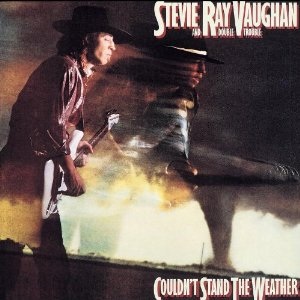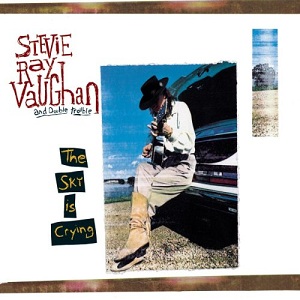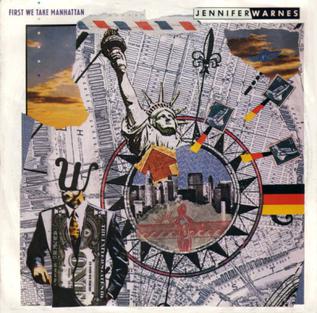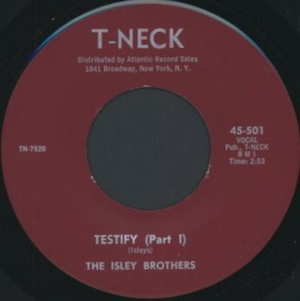
Stephen Ray Vaughan was an American musician, singer, songwriter, and record producer, best known as the guitarist and frontman of the blues rock band Double Trouble. Although his mainstream career only spanned seven years, he is considered to be one of the most iconic and influential musicians in the history of blues music, and one of the greatest guitarists of all time.

Texas Flood is the debut studio album by the American blues rock band Stevie Ray Vaughan and Double Trouble, released on June 13, 1983 by Epic Records. The album was named after a cover featured on the album, "Texas Flood", which was first recorded by blues singer Larry Davis in 1958. Produced by the band and recording engineer Richard Mullen, Texas Flood was recorded in the space of three days at Jackson Browne's personal recording studio in Los Angeles. Vaughan wrote six of the album's ten tracks.

In Step is the fourth studio album by Stevie Ray Vaughan and Double Trouble released in 1989. The title In Step can be seen as referring to Vaughan's new-found sobriety, following the years of drug and alcohol use that eventually led Vaughan into rehabilitation. It was also Vaughan's final album with Double Trouble, and also Vaughan's last album to be released during his lifetime. In 1990, he recorded a collaboration album with his brother, Jimmie Vaughan, called Family Style; later that year, Stevie Ray Vaughan died in a helicopter crash.

Couldn't Stand the Weather is the second studio album by American blues rock band Stevie Ray Vaughan and Double Trouble. It was released on May 15, 1984, by Epic Records as the follow-up to the band's critically and commercially successful 1983 album, Texas Flood. Recording sessions took place in January 1984 at the Power Station in New York City.

James Edward Allchin is an American guitarist, computer scientist, and philanthropist. He is a former Microsoft executive.

Jimmie Lawrence Vaughan is an American blues rock guitarist and singer based in Austin, Texas. He is the older brother of the late Texas blues guitarist Stevie Ray Vaughan.

Doyle Bramhall II is an American musician, producer, guitarist, and songwriter known for his work with Eric Clapton, Roger Waters, and many others. He is the son of the songwriter and drummer Doyle Bramhall.

Lonnie McIntosh, known as Lonnie Mack, was an American singer-guitarist. He was a pioneer of blues-rock music and rock guitar melodic soloing.

Double Trouble is an American blues rock band from Austin, Texas which served as the backing band for guitarist/singer Stevie Ray Vaughan. The group was active throughout the 1980s and contributed to reviving the blues, inspiring many later blues and rock musicians. Formed in Austin, Texas in 1978, the group went through several early line-up changes before settling on a power trio consisting of Vaughan, Chris Layton (drums), Tommy Shannon (bass). They became a four-piece by 1985 after adding Reese Wynans (keyboards). While with Vaughan the band was billed Stevie Ray Vaughan and Double Trouble. Rooted in blues and rock music, the group worked in many genres ranging from ballads to soul, often incorporating jazz and other elements.

Albert Cummings is an American blues musician who has recorded under Blind Pig Records. He has played alongside B.B. King, Johnny Winter, and Buddy Guy.

The Sky Is Crying is a compilation of songs recorded by Stevie Ray Vaughan and Double Trouble spanning most of their career. Released 14 months after Vaughan's death in 1990, the album features ten previously unreleased tracks recorded between 1984 and 1989. Only one title, "Empty Arms", appeared on any of the group's previous albums. The tracks were compiled by Vaughan's brother, Jimmie Vaughan, and was Vaughan's highest charting album at number 10.

Live at Carnegie Hall is the ninth album by American blues rock band Stevie Ray Vaughan and Double Trouble, released by Epic Records in July 1997. The album consists of live selections from their sold-out October 4, 1984 benefit concert at Carnegie Hall for the T.J. Martell Foundation. Backed by a ten-piece big band for the second half of the event, Vaughan had celebrated his thirtieth birthday the night before, and called the concert his "best birthday ever, forever". The band's double-set performance, which included several blues and R&B standards, was highly successful, receiving mostly positive reviews from music critics.

"First We Take Manhattan" is a song written by Canadian singer-songwriter Leonard Cohen. It was originally recorded by American singer Jennifer Warnes on her 1986 Cohen tribute album Famous Blue Raincoat, which consisted entirely of songs written or co-written by Cohen.

"Testify" is an uptempo soul song by the American rhythm and blues group the Isley Brothers. Written by the Isleys and recorded in 1964, it followed several successful singles by the group and was the first single to appear on their own T-Neck record label.

The Couldn't Stand the Weather Tour was a worldwide concert tour by blues rock band Stevie Ray Vaughan and Double Trouble. Produced in support of their 1984 album Couldn't Stand the Weather, the tour visited North America, Europe, Australasia and Japan from 1984 to 1985. To reflect the new musical direction that the group took with Couldn't Stand the Weather, the tour was aimed to differ from their past and surpass expectations of the band. In comparison to Vaughan and Double Trouble's modest stage setup from the previous Texas Flood Tour, the Couldn't Stand the Weather Tour involved a slightly more elaborate production. It utilized grander amplifier setups and sound systems to take advantage of the larger venues in which they performed. To avoid their renowned strictly blues material, Vaughan and Double Trouble embodied a more expanded and varied repertoire during performances. In disparity to the previous tour, each of the Couldn't Stand the Weather shows opened with mostly the same three songs before other material was played. The album and the tour were the beginnings of the group's mid-eighties musical development.
The Soul to Soul Tour was a concert tour through North America, Europe and Australasia, undertaken by American blues rock band Stevie Ray Vaughan and Double Trouble from 1985 through 1986. At the beginning of the tour, the band had finished recording their album Soul to Soul. Their commercial and critical acclaim had been demonstrated during the Couldn't Stand the Weather Tour in 1984, when they had played before a sold-out audience at Carnegie Hall. Longing for opportunities to expand the group's lineup, Vaughan and Double Trouble hired keyboardist Reese Wynans during the Soul to Soul recording sessions in Dallas, Texas. Throughout the tour, the band's success was confirmed as their performances consistently amazed and gratified their audiences.

The Live Alive Tour was a concert tour through North America and Europe, undertaken by Stevie Ray Vaughan and Double Trouble from 1986 to 1988. At the start of the tour, Vaughan and bassist Tommy Shannon had both achieved sobriety. Their success with overcoming long-term drug and alcohol addiction had been attained by entering a rehabilitation facility, where they stayed for four weeks. Although Vaughan was nervous about performing while sober, he received encouragement from his bandmates. Throughout the tour during performances, Vaughan would warn his audiences about the dangers of substance abuse.

Stevie Ray Vaughan was an American blues rock guitarist, singer, and songwriter, and the frontman for the band Double Trouble. During his career he released four studio albums, one live album, and several singles.

Denny Freeman is an American Texas and electric blues guitarist. Although he is primarily known as a guitar player, Freeman has also played piano and electronic organ, both in concert and on various recordings. He has worked with Stevie Ray Vaughan, Jimmie Vaughan, Bob Dylan, Angela Strehli, Lou Ann Barton, James Cotton, Taj Mahal, and Percy Sledge amongst others.

Blues at Sunrise is an album by Stevie Ray Vaughan and Double Trouble, released on April 4, 2000. Released a decade after his death, the album features ten previously unreleased songs from Vaughan.


















